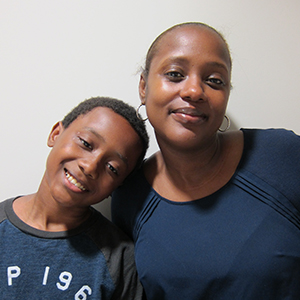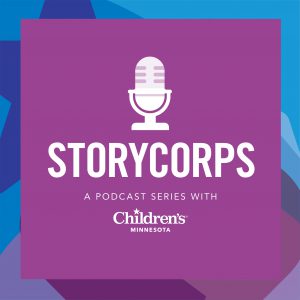Sickle Cell: Oliver and Charlie’s story


About this episode
Oliver discusses his experience with sickle cell, including triumphs and challenges. His mother, Charlie, discusses the support she has received through her family and Children’s Minnesota.
Topics:
- Diagnosis
- Support: Family & Children’s Minnesota
- Sickle Cell Crisis
- Resilience
Transcript
Charlie: Well I didn’t know back then since I was younger, I didn’t know. Nowadays you can find out what can be wrong with your child by having certain tests done. I didn’t know that this was something that was a possibility. I knew my status of having sickle-cell trait. I didn’t know your dad’s status that he had the trait, and then that our baby would have the disease or that there was a possibility of the baby having the disease. When I found out, Oliver, you probably was ten days old. I got a phone call from the doctor. He just was like, ‘Charlie I just want to let you know I got your newborn screening results back, and your son has sickle-cell disease.’ I’m like, ‘What is that? What does that mean?’ He really couldn’t provide me with the information, and it was over the phone and it was the worst way to deliver bad news to somebody. It was one of the worst days.
Oliver: I have sickle cell. It is sometimes difficult to deal with. I have to take medicine for it every day. Sometimes I do not take it. Besides that there’s nothing to it really. It’s not avoidable. I take hydroxyurea. I have to take it twice. I have to take two pills. I have to be on an oxygen tank every night. Sometimes I forget to do that. I have inhalers I’m supposed to take every day or as needed. Sometimes I use those when I’m out of breath. I have a nebulizer. That’s really it. I try to stay healthy drinking water. I forget or when I do not feel like taking them, I just dodge it, try to avoid taking them. It sometimes nerve wracking, because I realize I do have sickle cell, and I do have to take medicine every day, because it keeps my body stable. It makes me more unique as a person, not like everybody else. Not trying to be saying ‘What are they saying?’ It helps with me being different to others, because I am already short and just that.
Charlie: What would be the worst thing about having sickle cell?
Oliver: Probably having to take the medicine and going to the hospital about it.
Charlie: What is it like when you’re in the hospital?
Oliver: Very boring depending on how long I’ve been there. Not fun to be in. Sad, because you don’t get to be near your family members that you want to be around, and it’s really not a place I like to be sometimes. Always yell at me about my medicine because it’s important. Tell me to get my oxygen machine. Pretty much telling me what to do, so I can keep my body healthy, bringing me to the hospital when needed, sitting there sometimes, just being there when I really need it when I’m sick or in pain.
Charlie: Are you ever scared when you are here at the clinic or the hospital?
Oliver: No, on very few occasions, like when I got surgery. That was scary, because I had never gotten it before, but besides that not really.
Charlie: How about one of the saddest moments?
Oliver: I guess I would say it would probably be in the hospital for surgery right before we were getting ready to go down there and we were sitting in the room talking about it. After that, I guess I don’t remember anything else.
Charlie: So how do you know it made you sad? What made it sad?
Oliver: Because you guys were sitting there, you were just talking about it, then my dad started playing around about it. It was just sad, because I didn’t want to I guess I didn’t want to go through with it at first, because I was thinking about it. It was scary, because when I looked down, when I woke up from the surgery probably a few hours later, I pulled my shirt up, and I saw the incision marks and stuff. You, my mom, because you always give me advice on what to do. You are there when I do need you. Even though we fight, you are still there. You show me what it’s like to be more I’d say probably adult like and how you should be able to be more self-independent wise, not having to wait on people to do stuff for you and do it on your own.
Charlie: How would you want people to remember you?
Oliver: Probably funny and not always but more than likely always in a good mood about anything.
Charlie: How has being a parent changed me? Being a parent has changed me to be more of a non-selfish person. It’s not always about me, as much as I may want it to be I have to take my kids into consideration in every decision that I make a choice. I always got to think what’s going to be best for you guys before I can do what I want to do. It has made me be a non-selfish person. What do I know now that I know earlier? I think I had to do of advocating on my own for you in regards to you. I guess knowledge is power, so the more you know, I guess the better the outcome. I really can’t be for sure what it is that I know now that I wish I had known earlier, because the information is still somewhat the same at a certain extent. The information is still the same. I just know during the first few years that you were diagnosed it was really hard dealing with you being sick, because I was a single parent. Luckily, I only had two children at the time, and I had a lot of support from my mom and from family, but it was a lot harder then than it probably would have been now. I guess that’s the main thing, Oliver, is your doctors here. That’s the one thing. I thank you for answering the questions that I asked you today.
We wish to extend our thanks to the families who have shared their story here about the impact of living with hemophilia and sickle cell disease. We would also like to thank the many who worked on this project:
The Children’s Minnesota StoryCorps Legacy Team:
Eddie Gonzalez, Jocelyn Bessette Gorlin, Susan Kearney, Stephen Nelson, Margaret Heisel-Kurth, Stephanie Davis, Angela Blue, Elizabeth McDonough, Jill Swenson and Alisa Linne.
Special thanks to:
Stephanie Moua, Hamdi Hussein, Sadia Farah, Fatima Ali, Caillyn Costello, Suzanne Lehman, Suzan Ulrich, D'Ann Urbaniak Lesch, Justin Nelson, Allison Albright, Marvin Holmes-Leopold, Jose Rodriguez and Mitch Hare.
Minneapolis Institute for Production and Recording:
Jose Rodriguez and Mitch Hare.